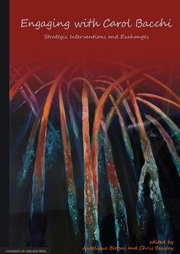Book contents
- Frontmatter
- Contents
- Acknowledgements
- List of Contributors
- Introduction
- Part I Looking back: On beginning
- Part II Strategic interventions and exchanges: Reflections and applications of the ‘What's the Problem Represented to be?’ approach
- Part III Strategic exchanges: The wider context
- Part IV Looking forward: Still engaged
10 - Strategic interventions and ontological politics: Research as political practice
from Part IV - Looking forward: Still engaged
Published online by Cambridge University Press: 05 June 2013
- Frontmatter
- Contents
- Acknowledgements
- List of Contributors
- Introduction
- Part I Looking back: On beginning
- Part II Strategic interventions and exchanges: Reflections and applications of the ‘What's the Problem Represented to be?’ approach
- Part III Strategic exchanges: The wider context
- Part IV Looking forward: Still engaged
Summary
The focus of this chapter—research as political practice—highlights a long-standing concern in my work with the connections between concepts and theories, and political investments. My particular interest is the ways these investments operate at non-conscious (note: not unconscious) levels and how they shape or constitute us as particular kinds of political subjects. In my PhD thesis on the range of reasons for supporting women's enfranchisement, I explored the packages of proposals and norms that featured in the practices and textual performances of the women and men involved in the English-Canadian suffrage movement. Of course I did not describe the project in those terms at the time. At the time I was an historian! And so the thesis was titled: ‘The ideas of the English-Canadian suffragists’ (Bacchi 1976, 1989, emphasis added). I have since learned new languages to express my interpretations. Finding new languages is exciting because they add a dimension to existing thinking. They sharpen an angle of analysis that you were developing while making you feel that, in a sense, you may have arrived home. I had this feeling when I encountered the term ‘ontological politics’ in the writing of Annemarie Mol (2002, 1999) and John Law (2009, 2004)—as I shall go on to discuss.
My reasons for highlighting the connections between research and political practice reflect my personal academic experience and the decision to take early retirement. In the later years of my academic career I felt less and less in control of the direction of my research. I felt more and more that I was acting in the service of ‘forces’ that somehow were empowered to set my research agenda.
- Type
- Chapter
- Information
- Engaging with Carol BacchiStrategic Interventions and Exchanges, pp. 141 - 157Publisher: The University of Adelaide PressPrint publication year: 2012
- 22
- Cited by



